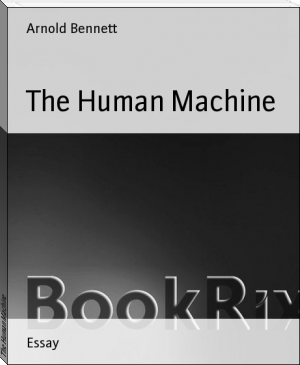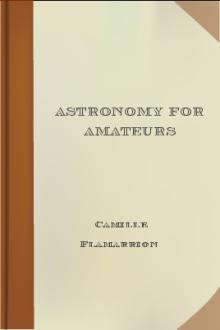The Human Machine - Arnold Bennett (sight word readers .TXT) 📗

- Author: Arnold Bennett
Book online «The Human Machine - Arnold Bennett (sight word readers .TXT) 📗». Author Arnold Bennett
It was not always thus. Though there have been previous ages as lustful for wealth and ostentation as our own, there have also been ages when money-getting and millionaire-envying were not the sole preoccupations of the average man. And such an age will undoubtedly succeed to ours. Few things would surprise me less, in social life, than the upspringing of some anti-luxury movement, the formation of some league or guild among the middling classes (where alone intellect is to be found in quantity), the members of which would bind themselves to stand aloof from all the great, silly, banal, ugly, and tedious _luxe_-activities of the time and not to spend more than a certain sum per annum on eating, drinking, covering their bodies, and being moved about like parcels from one spot of the earth's surface to another. Such a movement would, and will, help towards the formation of an opinion which would condemn lavish expenditure on personal satisfactions as bad form. However, the shareholders of grand hotels, restaurants, and race-courses of all sorts, together with popular singers and barristers, etc., need feel no immediate alarm. The movement is not yet.
As touching the effect of money on the efficient ordering of the human machine, there is happily no necessity to inform those who have begun to interest themselves in the conduct of their own brains that money counts for very little in that paramount affair. Nothing that really helps towards perfection costs more than is within the means of every person who reads these pages. The expenses connected with daily meditation, with the building-up of mental habits, with the practice of self-control and of cheerfulness, with the enthronement of reason over the rabble of primeval instincts--these expenses are really, you know, trifling. And whether you get that well-deserved rise of a pound a week or whether you don't, you may anyhow go ahead with the machine; it isn't a motor-car, though I started by comparing it to one. And even when, having to a certain extent mastered, through sensible management of the machine, the art of achieving a daily content and dignity, you come to the embroidery of life--even the best embroidery of life is not absolutely ruinous. Meat may go up in price--it has done--but books won't. Admission to picture galleries and concerts and so forth will remain quite low. The views from Richmond Hill or Hindhead, or along Pall Mall at sunset, the smell of the earth, the taste of fruit and of kisses--these things are unaffected by the machinations of trusts and the hysteria of stock exchanges. Travel, which after books is the finest of all embroideries (and which is not to be valued by the mile but by the quality), is decidedly cheaper than ever it was. All that is required is ingenuity in one's expenditure. And much ingenuity with a little money is vastly more profitable and amusing than much money without ingenuity.
And all the while as you read this you are saying, with your impatient sneer: 'It's all very well; it's all very fine talking, _but_ ...' In brief, you are not convinced. You cannot deracinate that wide-rooted dogma within your soul that more money means more joy. I regret it. But let me put one question, and let me ask you to answer it honestly. Your financial means are greater now than they used to be. Are you happier or less discontented than you used to be? Taking your existence day by day, hour by hour, judging it by the mysterious _feel_ (in the chest) of responsibilities, worries, positive joys and satisfactions, are you genuinely happier than you used to be?
I do not wish to be misunderstood. The financial question cannot be ignored. If it is true that money does not bring happiness, it is no less true that the lack of money induces a state of affairs in which efficient living becomes doubly difficult. These two propositions, superficially perhaps self-contradictory, are not really so. A modest income suffices for the fullest realisation of the Ego in terms of content and dignity; but you must live within it. You cannot righteously ignore money. A man, for instance, who cultivates himself and instructs a family of daughters in everything except the ability to earn their own livelihood, and then has the impudence to die suddenly without leaving a penny--that man is a scoundrel. Ninety--or should I say ninety-nine?--per cent. of all those anxieties which render proper living almost impossible are caused by the habit of walking on the edge of one's income as one might walk on the edge of a precipice. The majority of Englishmen have some financial worry or other continually, everlastingly at the back of their minds. The sacrifice necessary to abolish this condition of things is more apparent than real. All spending is a matter of habit.
Speaking generally, a man can contrive, out of an extremely modest income, to have all that he needs--unless he needs the esteem of snobs. Habit may, and habit usually does, make it just as difficult to keep a family on two thousand a year as on two hundred. I suppose that for the majority of men the suspension of income for a single month would mean either bankruptcy, the usurer, or acute inconvenience. Impossible, under such circumstances, to be in full and independent possession of one's immortal soul! Hence I should be inclined to say that the first preliminary to a proper control of the machine is the habit of spending decidedly less than one earns or receives. The veriest automaton of a clerk ought to have the wherewithal of a whole year as a shield against the caprices of his employer. It would be as reasonable to expect the inhabitants of an unfortified city in the midst of a plain occupied by a hostile army to apply themselves successfully to the study of logarithms or metaphysics, as to expect a man without a year's income in his safe to apply himself successfully to the true art of living.
And the whole secret of relative freedom from financial anxiety lies not in income, but in expenditure. I am ashamed to utter this antique platitude. But, like most aphorisms of unassailable wisdom, it is completely ignored. You say, of course, that it is not easy to leave a margin between your expenditure and your present income. I know it. I fraternally shake your hand. Still it is, in most cases, far easier to lessen one's expenditure than to increase one's income without increasing one's expenditure. The alternative is before you. However you decide, be assured that the foundation of philosophy is a margin, and that the margin can always be had.
XVI
REASON, REASON!
In conclusion, I must insist upon several results of what I may call the 'intensive culture' of the reason. The brain will not only grow more effectively powerful in the departments of life where the brain is supposed specially to work, but it will also enlarge the circle of its activities. It will assuredly interfere in everything. The student of himself must necessarily conduct his existence more and more according to the views of his brain. This will be most salutary and agreeable both for himself and for the rest of the world. You object. You say it will be a pity when mankind refers everything to reason. You talk about the heart. You envisage an entirely reasonable existence as a harsh and callous existence. Not so. When the reason and the heart come into conflict the heart is invariably wrong. I do not say that the reason is always entirely right, but I do say that it is always less wrong than the heart. The empire of the reason is not universal, but within its empire reason is supreme, and if other forces challenge it on its own soil they must take the consequences. Nearly always, when the heart opposes the brain, the heart is merely a pretty name which we give to our idleness and our egotism.
We pass along the Strand and see a respectable young widow standing in the gutter, with a baby in her arms and a couple of boxes of matches in one hand. We know she is a widow because of her weeds, and we know she is respectable by her clothes. We know she is not begging because she is selling matches. The sight of her in the gutter pains our heart. Our heart weeps and gives the woman a penny in exchange for a halfpenny box of matches, and the pain of our heart is thereby assuaged. Our heart has performed a good action. But later on our reason (unfortunately asleep at the moment) wakes up and says: 'That baby was hired; the weeds and matches merely a dodge. The whole affair was a spectacle got up to extract money from a fool like you. It is as mechanical as a penny in the slot. Instead of relieving distress you have simply helped to perpetuate an infamous system. You ought to know that you can't do good in that offhand way.' The heart gives pennies in the street. The brain runs the Charity Organisation Society. Of course, to give pennies in the street is much less trouble than to run the C.O.S. As a method of producing a quick, inexpensive, and pleasing effect on one's egotism the C.O.S. is simply not in it with this dodge of giving pennies at random, without inquiry. Only--which of the two devices ought to be accused of harshness and callousness? Which of them is truly kind? I bring forward the respectable young widow as a sample case of the Heart _v_. Brain conflict. All other cases are the same. The brain is always more kind than the heart; the brain is always more willing than the heart to put itself to a great deal of trouble for a very little reward; the brain always does the difficult, unselfish thing, and the heart always does the facile, showy thing. Naturally the result of the brain's activity on society is always more advantageous than the result of the heart's activity.
Another point. I have tried to show that, if the reason is put in command of the feelings, it is impossible to assume an attitude of blame towards any person whatsoever for any act whatsoever. The habit of blaming must depart absolutely. It is no argument against this statement that it involves anarchy and the demolition of society. Even if it did (which emphatically it does not), that would not affect its truth. All great truths have been assailed on the ground that to accept them meant the end of everything. As if that mattered! As I make no claim to be the discoverer of this truth I have no hesitation in announcing it to be one of the most important truths that the world has yet to learn.





Comments (0)